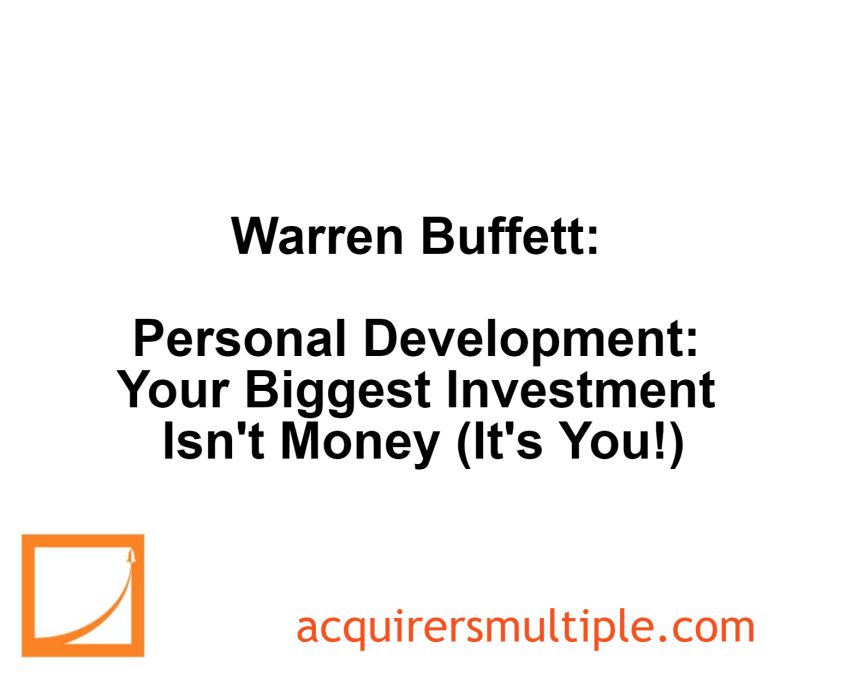During the 2005 Berkshire Hathaway Annual Meeting, Warren Buffett discussed the importance of investing in yourself, the need to focus on good businesses in the U.S, and Berkshire’s unconventional approach to investing. His key points are:
- Investing in yourself is the best investment: He believes developing your own skills and abilities is more valuable than individual stock selection or currency trading. He values a competent individual at $1 million and encourages self-improvement over speculating in foreign exchange.
- Focus on good businesses in the U.S: He advises against worrying about foreign exchange or future debt burdens. As long as you have a good business earning dollars in the U.S, you’ll be fine.
- Berkshire’s unconventional approach: Berkshire Hathaway doesn’t do conventional asset allocation. They seek opportunities regardless of category and believe this approach is superior to modern investment management.
Warren Buffett’s emphasis on investing in oneself underscores the critical importance of employee skill development within any organization.
Much like Berkshire Hathaway’s unconventional approach to investing, businesses should adopt innovative strategies for employee development that go beyond traditional methods.
By seeking out diverse learning opportunities and embracing non-traditional training solutions, companies can build a more versatile and resilient workforce.
Collaborating with providers such as Train SMART Inc allows organizations to implement creative and effective development programs that empower employees to reach their full potential, ultimately leading to sustained success in the ever-evolving business landscape.
Here’s an excerpt from the meeting:
WARREN BUFFETT: I think it’s very tough for individuals to either select individual stocks, select individual times to enter the market, select currencies.
I mean, I just think that’s a game that they tend to get interested in at the wrong time. There’s some adverse selection, in terms of when people who do not follow stocks carefully get interested in stocks.
I think that, you know, the best investment you can have, for most people, is in your own abilities.
I mean, when I talk to students, you know, I would pay a student — in many cases, I would be glad to, you know, pay them $100,000, cash up front, for 10 percent of all their future earnings.
So, I’m willing to pay 100,000 for 10 percent of them, I’m valuing the whole person at a million dollars, just capital value standing there in front of me.
And those — anything you do to develop your own abilities is probably going to be — or your own business — is probably going to be more productive for you than starting to think about individually making commitments into foreign exchange.
If you have a good business in this country earning money in dollars, you’ll do ok. I mean, you may live in a world 20 years from now where a couple percent of the GDP is going to service the debts and the ownership that we’ve created now by running these deficits.
But you’ll do fine in America. So, I wouldn’t worry about that much.
Charlie?
CHARLIE MUNGER: Well, if you look at Berkshire, you will find that it really doesn’t do much of conventional asset allocation to categories.
We are looking for opportunities and we don’t much care what category they’re in, and we certainly don’t want to have our search for opportunities governed by some predetermined artificial bunch of categories.
In this sense, we’re totally out of step with modern investment management, but we think they’re wrong.
WARREN BUFFETT: Yeah. And incidentally, we have 80 percent of our money, or more — well over 80 percent — tied to this country and to the dollar. So it’s not like, you know, we’ve left the country or anything of the sort.
CHARLIE MUNGER: When have you done a big asset allocation strategy?
WARREN BUFFETT: Never.
CHARLIE MUNGER: Yeah.
WARREN BUFFETT: Yeah.
We end up with peculiar asset mixes. I mean, if the junk bond thing had gone on a little longer, instead of having 7 billion in there, we might have had 30 billion in.
But we were doing that simply based on the fact that it was screaming at us.
And we do the same thing with equities. I mean, back — for many years, we had more than the net worth of Berkshire in equity positions. But they were cheap.
CHARLIE MUNGER: And I want you to remember one of my favorite sayings as you do this asset allocation. “If a thing’s not worth doing at all, it’s not worth doing well.” (Laughter)
WARREN BUFFETT: You can see why Ben Franklin turned the mantle over to Charlie. (Laughter)
You can watch the entire discussion here:
For all the latest news and podcasts, join our free newsletter here.
Don’t forget to check out our FREE Large Cap 1000 – Stock Screener, here at The Acquirer’s Multiple:



